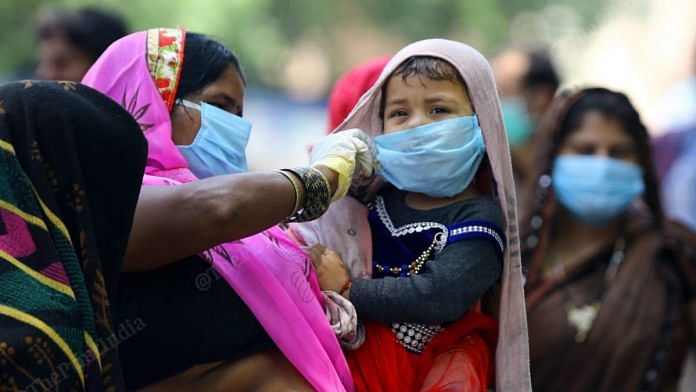New Delhi: Bharat Biotech Ltd is expected to begin the paediatric trials of it Covid-19 vaccine, Covaxin, in June, but public health experts in India seem to be wary of the decision.
Speaking to ThePrint, several experts point out that the trials on children could be risky due to a number of reasons — different immunity levels in children, side-effects, unethical conduct of trial and lack of evidence that children are under threat of serious illness. They also note that a nasal vaccine would be better for children.
The Bharat Biotech trial will take place on 525 subjects at various sites, including the All India Institute of Medical Science (AIIMS) Delhi, AIIMS Patna and Meditrina Institute of Medical Sciences in Nagpur.
The Drug Controller General of India gave the Hyderabad-based pharma company the green light to conduct the trials in the 2-18 age group on 13 May. In the trial, the vaccine will be given by intramuscular route in two doses, on day 0 and day 28.
Also read: For Covaxin to get emergency use approval, WHO needs ‘more information’ from Bharat Biotech
What Indian experts say
While teens and children are predicted to be the worst affected in the third Covid wave in India, child health experts and paediatricians remain wary of the notion.
Giridhara R. Babu, a public health expert at the Public Health Foundation of India, noted the ethical dilemma of conducting trials on children.
“During such research, parents have to give the assent for partaking in such trials. If the child of a higher age is informed regarding the procedure and the possible outcomes, once he gives an assent as well, only then trials are conducted on them,” he said.
“There are strict regulations around the trials that are conducted on children because they are malleable and can be easily misguided. Even if it is something as beneficial as a vaccine, there are chances of side effects since their system is completely different than that of adults,” Babu said.
According to him, the epidemiology currently indicates that children are not at greater risk, but “we don’t know if the vaccine will behave the same”.
“Therefore, very careful, ethical conduct of the trial is mandated for the children, so that creates a lot of challenges like what kind of children should be selected and what kind of initial studies to conduct. So the onus of the burden of proof is on the researchers,” he said.
“The ethical responsibility on the researchers here is to stop the trial if they see any adverse effect which goes beyond the protocol,” Babu added.
Dr Vipin Vashishtha, who is the national convener of the Advisory Committee of Vaccines and Immunization Practices at the Indian Academy of Pediatrics, said there isn’t enough evidence to support the trials being conducted on children.
“The vaccine trials will not see any major problems since the World Health Organization and India have been conducting several Universal Immunisation Programmes in the country. The matter of concern for paediatrics is there is no seroepidemiological analysis yet that indicates that children between 0-5 years of age are under threat of serious illness,” he said.
“Whenever children get this infection, most cases are mild and only 0.001 per cent require hospitalisation,” he said.
Vashishtha added, “How can the country think of vaccinating young children when only a small percentage of its vulnerable population has been vaccinated?”
Nasal vaccine better
Anand Lakshman, a public health specialist focusing on child health and founder and CEO of one-stop-shop paediatric primary healthcare service provider AddressHealth, said if Bharat Biotech is able to conduct trials on its nasal Covid vaccine for children, then it would be something the whole world will “look forward to”.
“There are two reasons for vaccination — to prevent severe disability and death or to prevent transmission. We know that data suggests that children are not severely affected by the disease but children can act as transmitters,” he said.
“Though the current intramuscular vaccines do not sufficiently prevent the spread of the disease, if Bharat Biotech’s nasal vaccine can provide mucosal immunity in children then their vaccine could be a game changer,” he said.
Although this nasal vaccine will have conduct trials to collect safety and efficacy data to prove its working, Lakshman added.
Also read: MP’s Satna has many Covid hotspots. But its hospitals are empty as no one trusts doctors
Trials on children in other countries
Some Western nations including the US have started vaccinating children above the age of 12. Pharma giants Pfizer and Moderna are already conducting trials of their Covid vaccines on children over six months old.
Researchers who have been a part of the trials on children suggest that the challenges in these trials are immense.
Inci Yildirim, MD, PhD, associate professor of paediatrics (infectious diseases) at Yale School of Medicine, said in a report that the difference in immunity is what makes the trial on children challenging.
“A clinical trial for a children’s COVID-19 vaccine requires the consideration of many additional factors… Children are not little adults. As children grow and develop, their immune system grows and develops. A 16-month-old is not the same as a 16-year-old. They are both children, but their capacity to respond to the vaccines is not the same,” said Yildirim, who is leading the Yale component of the Moderna trial.
The protocol Yildirim will follow in her trial consists of two parts — “the first, which seeks to determine a safe dose of the antigen; and the second, to test whether the dose is effective”.
Different dosages of the vaccine — 10 micrograms, 20 micrograms and 30 micrograms — are being tested in three age groups under the Pfizer trial, in accordance with the tolerance levels.
(Edited by Amit Upadhyaya)
Also read: Signs of gangrene could be an indication of severe Covid, RML doctors say in study



